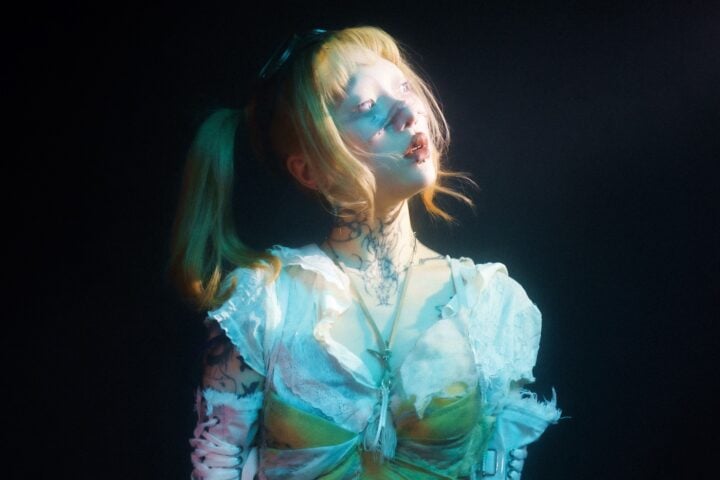April Harper Grey, a.k.a. Underscores, puts a bratty, intentionally jarring spin on hyperpop, with funk basslines, dubstep wobbles, and trap beats that at times feel like eclecticism for its own sake. On her second studio album, Wallsocket, the San Francisco-based singer, songwriter, and producer’s sound has noticeably matured. The songs are still youthful—“Locals (Girls Like Us)” and “Johnny Johnny Johnny” feature sing-along choruses that echo pep-rally cheers—but she sings from a comparably wizened POV.
Wallsocket is written from the perspectives of troubled young characters, from a woman struggling with an illness that’s “as rare as it gets” to a girl being love-bombed by a pedophile. Themes of class resentment and alienation course through the album’s 12 songs: On “Shoot to Kill, Kill Your Darlings,” Grey wonders why a rich kid would want to join the military, while “Old Money Bitch” finds her sneering at the daughter of a billionaire who’s fallen on hard times.
Throughout, the songs on Wallsocket flit from one style or tone to the next, mirroring the mental states of Grey’s characters. The album’s most rock-oriented track, the brash “Cops and Robbers,” describes a bank teller who scams his customers to pay for his methamphetamine habit, proud that he can do so without “a ski mask and a gun.” The song’s frenetic pacing cleverly reflects both the man’s desperation and the effects of his vice.
“Geez Louise” begins as a punk rant, with Grey shouting the titular phrase over a racing beat, but the track quickly shifts into a slower, more subdued acoustic guitar-based section. Elsewhere, “Duhhhhhhhhhhhhhhhhhh” features a loop of a woman speaking the title accompanied by little else aside from Grey’s voice and some relaxed percussion and synthesizer before the proceedings are interrupted by blasts of noise and an unexpected harmonica solo.
Grey’s elaborate song structures and conceptual trappings harken back to ’70s art rock, but the situations she describes are specific to present-day life in America, particularly the sense that the country is backsliding into greater inequality. Wallsocket is the musical equivalent of films like Emma Seligman’s Bottoms or Jennifer Reeder’s high-school horror fantasias, as each relates ordinary characters’ lives while subverting genre tropes—in this case, Springsteen-style tales of escaping small towns, in the process lending the songs a similar mythic grandeur.
Since 2001, we've brought you uncompromising, candid takes on the world of film, music, television, video games, theater, and more. Independently owned and operated publications like Slant have been hit hard in recent years, but we’re committed to keeping our content free and accessible—meaning no paywalls or fees.
If you like what we do, please consider subscribing to our Patreon or making a donation.




Thanks